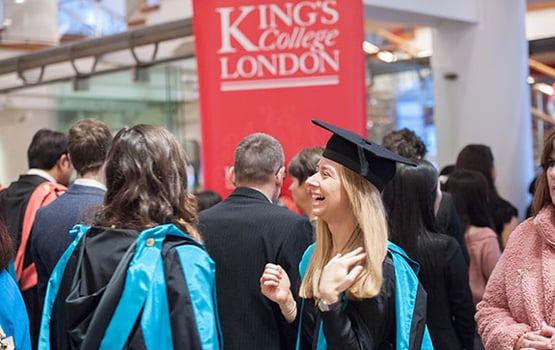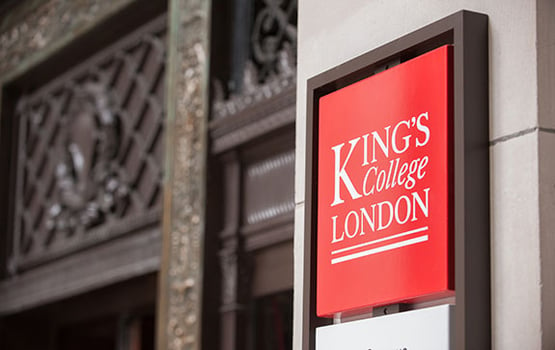Online, part-time
Digital Futures MAProfessionals who can spot and capitalise on current and future digital trends in culture and society are in high demand globally. Our fully online MA nurtures the creativity and critical thinking needed to do just that.
Key information
|
Study mode: |
100% online |
|
Duration: |
2 years, part time |
|
Next start date: |
29 September 2025 |
|
Application deadline: |
1 September 2025 |
|
Intakes: |
September 2025 and January 2026 |
|
Tuition fees: |
£16,416 * (funding options and instalments are available) |
These tuition fees may be subject to increases in subsequent years of study, in line with King's terms and conditions.
* Depending on your country of residence, you may also have to pay Goods and Services Tax (GST) in addition to your tuition fees. You can find further information on the King's Goods and Services tax page.
Course overview
In a rapidly changing world, digital expertise is more crucial than ever. Businesses and organisations need individuals who can envision and implement impactful digital solutions that meet user needs, add value, and enhance our lives.
Regardless of your career sector, understanding the current digital landscape and its opportunities and challenges is essential.
This MA programme immerses you in digital trends across various industries, including cultural, creative, media, and gaming sectors. You'll explore today's most pressing topics such as health and wellbeing, activism, politics, and ecology.
From AI to smart cities, you’ll examine the latest digital developments and tackle crucial issues related to profitability, sustainability, and ethics.
Apply now
Why choose this online MA?
Specialist modules
Focus on emerging technologies like artificial intelligence, and explore digital marketing practices around the world.
Cutting-edge insight
Explore ways in which technology can improve our lives, addressing real human and social challenges, limitations and risks.
See technology through a human lens
Harnessing the power of digital is more than understanding big data. This MA considers the impact from various cultural, economic and social perspectives.
Networking opportunities
The Department of Digital Humanities engages with other universities, libraries and directly with industry - including the BBC, Royal Opera House and Tate Modern - among others.
About the Digital Futures Institute
This course is part of the Digital Futures Institute. Its curriculum is enhanced by the Institute's commitment to interdisciplinary research, combining insights from SHAPE, STEM, and artificial intelligence. The Institute's focus on creating better digital futures through ethical practices, diversity, and cultural understanding directly aligns with the course's objectives. This connection broadens your educational scope and deepens the practical impact you can make in technology and society.
What you'll study
This forward-thinking MA is designed to boost your digital and professional expertise. You’ll gain skills that prepare you to lead digital initiatives and understand the key drivers, changes, and opportunities in the digital landscape.
Course content includes:
- Digital innovation and AI
- Digital media and creativity
- Sustainability and ethics
- Communication and social media across various industries
Equip yourself with the knowledge and skills to navigate and shape the future of digital solutions, enhancing your career prospects and making a significant impact in your field.
Watch a video overview with the joint Programme Directors
Hello. I'm Dr Rob Gallagher, one of the joint Programme Directors for the Digital Futures MA here at King's College London.
This programme offers a unique blend of theory and practice, focusing on the latest developments in digital media, technology, and culture.
The course is delivered collaboratively and covers a wide range of topics taught by experts in their fields across disciplines, ensuring a comprehensive and multifaceted approach to digital studies.
I'm Dr Giota Alevizou, joint Programme Director.
The Digital Futures MA covers a wide range of topics, such as digital innovation, technologies like AI, digital media, creativity, communication, and social media across different industries.
Our modules are designed to equip you with the skills needed to navigate and influence the digital world.
Our curriculum also includes specialised topics such as digital sustainability, digital ethics, and the impact of digital technologies on various industries like media, gaming, and cultural heritage. One of the key benefits of studying with us is the flexibility of online learning.
Our course is delivered entirely online, allowing you to balance your studies with your personal and professional commitments.
Whether you're looking to switch careers or enhance your digital skills, this program is designed to fit around your busy life.
Online learning at King's College London means you can study from anywhere in the world, at a time that suits you. Our digital platform fosters collaboration and interaction, ensuring you feel connected and supported throughout your studies.
Choosing the Digital Futures MA at King's College London means you'll be learning from the leading experts in the field.
Our curriculum is constantly updated to reflect some of the latest trends in technologies, ensuring you receive a cutting-edge education.
Digital innovations are driving developments in business, politics, education, health, and the creative industries, to name just a few sectors.
There's a growing demand for the all round expertise required to understand and generate ideas and to comprehensively evaluate challenges, issues, and potential solutions.
Professionals who can spot and capitalise on current and future digital trends in culture and society are in high demand globally.
This fully online MA nurtures the creativity and critical thinking needed to do just that.
King's College London is an institution with a rich history of academic excellence.
By joining our community, you will be part of a globally recognised university that is at the forefront of research and innovation.
Our programme not only prepares you for a successful career in the digital sector, but also gives you the tools to think critically about the impact of digital technologies on society.
You will graduate with a comprehensive understanding of the digital landscape and the ability to drive change within it.
Module overview
This online Digital Futures MA comprises nine modules: two 30-credit core modules, two 15-credit core modules, one 30-credit Dissertation, and four 15-credit specialist modules (180 credits in total). All modules on the course are required, and you must pass all the modules to complete the award. King’s College London reviews the modules offered on a regular basis to provide up-to-date, innovative, and relevant programmes of study. Therefore, modules on offer may change from year to year.
Core modules:
The module explores current and emerging trends in the digital landscape, focusing on technological transformation concepts like trendsetting, prediction, and future casting. It uses a historically informed theoretical approach to examine social and technical changes through past, present, and future examples of emerging media.
Looking at the material aspects and functionalities of various media platforms and products, you’ll investigate the impact of innovations such as platformisation, automation, mediatisation, appification, and gamification on users' lives.
You’ll develop analytical methods of critically and ethically evaluating digital phenomena, and a systematic understanding of digital contexts for your own investigations into alternative digital futures.
This module explores how digital technologies impact the sustainability of ecosystems, infrastructures, communities, and livelihoods. You'll critically examine the exploitative and extractive aspects of digital culture, from raw material mining to the harvesting of training data for AI models.
Assessing the ecological impact of digital technologies, you’ll also analyse how digital platforms can exacerbate inequality and political instability. But the module isn’t just about recognising barriers to sustainability; it also challenges you to adopt a solutions-oriented stance, equipping you to imagine more ethical, equitable, and sustainable digital futures.
Drawing on case studies from green design, policy making, art and activism, you’ll collaborate with peers and develop proposals for positive change.
In this module, you’ll learn how to design your dissertation from start to finish. You’ll get a clear overview of the different approaches, methods and what is expected within the scope of an MA dissertation.
You’ll also explore the various forms your dissertation can take, such as project based, empirical or theoretical, and you’ll gain practical guidance on how to work effectively with your dissertation supervisor.
In this module, you'll focus more specifically on the topic of your dissertation. You'll learn how your work connects to existing research, gain an understanding of the process of knowledge development, explore different perspectives on knowledge, and see how these networks grow through publication.
In this module, you’ll develop an independent research project in a topic related to the Digital Futures MA.
You'll take part in both a colloquium and supervision. The colloquium is your chance to share your progress with peers and supervisors and get constructive feedback.
You'll present your work asynchronously, with the option of live sessions for comments and questions if needed. One-to-one supervision will give you the opportunity to meet individually with your supervisor.
Your final dissertation submission will build on your earlier work, but it can't include any text you've already submitted to ensure academic integrity.
Specialist modules:
Artificial intelligence (AI) encompasses technologies including conversational interfaces, self-driving cars, and applications in policing, medical care, and social care. This overview explores AI's diverse applications, along with its associated key issues and debates.
Consequently, you’ll develop a deep understanding of AI's current developments. We'll evaluate AI's use in various fields, understand the technical concepts behind these uses, and address the societal challenges posed by AI.
We'll also reflect on potential responses, including policy and regulations, to manage AI's impact. In doing so, you’ll then be able to evaluate AI applications from a critical and ethical standpoint in your substantial investigations.
This module provides a critical introduction to the gaming industries and their intersecting cultures. We'll treat the gaming sector as a series of industries across various platforms, with unique histories and contexts.
Topics include the development of industry sectors over time and space, global and regional structures, the nature of careers in gaming, and industry segments (e.g., AAA, casual, indie).
We'll also cover media adaptation, localisation for different markets, and the complex interplay between gaming cultures and industry.
Key focus areas include diversity, representation, co-creation, places of play, eSports, streaming, and other emerging trends in gaming cultures.
This module examines the global circulation of physical and virtual media, highlighting the power of distributors and publishers to determine how audiences access and engage with media.
Offering insights into the mechanics of formal distribution, the module also shines a light on the informal distribution strategies of pirates, bootleggers and fan communities.
Drawing on media archaeology, infrastructure studies, and distribution studies, among other fields, you'll explore how media are disseminated, archived, merchandised and repurposed today.
Focusing primarily on film and television, the module also addresses case studies from gaming, music, and the arts.
This module enhances your understanding of social media platforms and their impact on digital marketing. It covers the theoretical relationship between social media, platforms, and marketing, supplemented with case studies and practical exercises.
You'll develop vital skills to evaluate social activity in the platform economy, examining phenomena like viral marketing, hype, and engagement within digital cultures.
The module focuses on critically appraising marketing practices and understanding their application in the digital domain. Additionally, you’ll gain hands-on experience in social media data analysis.
Meet the joint Programme Directors
How you’re assessed
Assessments are designed to test your knowledge, understanding and critical awareness of the topics discussed during the course. They also assess your ability to analyse and apply specialist knowledge to practice. The assessment methods may vary between modules. They’re likely to include one or more of the following:
Group projects
Group projects
Written coursework
(essays and reports)
Written coursework
(essays and reports)
Dissertation
Dissertation
Entry requirements
A high 2:1 (65% or above) honours degree (or above) or international equivalent in a social science, computer science/ informatics or humanities subject.
If you have a lower degree classification, or a degree in an unrelated subject, your application may be considered if you can demonstrate significant relevant work experience, or offer a related graduate qualification (such as a master's or PGDip).
You’ll need to meet ONE of the following criteria:
- A 2:2 honours degree or international equivalent in a related subject (as above). Your application will need to be supported by a CV highlighting relevant experience (or related graduate qualification, e.g. PGDip) and a 500-word written statement (see details under ‘Written statement and supporting information’ below).
- A 2:1 honours degree or international equivalent in a non-related subject. Your application will need to be supported by a CV highlighting relevant experience (or related graduate qualification, e.g. PGDip) and a 500-word written statement (see details under ‘Written statement and supporting information’ below).
- An ordinary or third-class honours degree or international equivalent in any subject area. Your application will need to be supported by a CV highlighting relevant experience (or related graduate qualification, e.g. PGDip) and a 500-word written statement (see details under ‘Written statement and supporting information’ below).
- A master’s degree at merit (or above) or international equivalent in a social science, computer science/ informatics or humanities subject.
- A master’s degree at merit (or above) or international equivalent in a non-related subject. Your application will need to be supported by a CV highlighting relevant experience (or related graduate qualification, e.g. PGDip) and a 500-word written statement (see details under ‘Written statement and supporting information’ below).
English language band: B
To study at King's, it is essential that you can communicate in English effectively in an academic environment. You’re usually required to provide certification of your competence in English before starting your studies.
Nationals of majority English speaking countries (as defined by the UKVI) who have permanently resided in this country are not usually required to complete an additional English language test. This is also the case for applicants who have successfully completed:
- An undergraduate degree (at least three years duration) within five years of the course start date.
- A postgraduate taught degree (at least one year) within five years of the course start date.
- A PhD in a majority English-speaking country (as defined by the UKVI) within five years of the course start date.
For information on our English language requirements and whether you need to complete an English language test, please see our English Language requirements page.
You'll need to submit two reference letters as part of your application.
Depending on your previous qualifications, you may need to submit a 500-written statement and CV highlighting relevant experience as part of your application.
If you’re required to submit a written statement, you’ll need to address the following two questions: ‘In your view, what are the key issues in the domain of digital culture and society? How will your professional career or academic trajectory benefit from studying them?’.
All applicants will need to submit a copy (or copies) of their official academic transcript(s), showing the subjects studied and marks obtained. If you have already completed your degree, copies of your official degree certificate will also be required. Applicants with academic documents issued in a language other than English, will need to submit both the original and official translation of their documents.

Not sure if you meet the requirements, or if the course is right for you? Speak to our team to get tailored support:
Discuss my optionsCareer options in Digital Futures
As digital technologies transform the world around us, it’s becoming increasingly clear that hard tech skills alone are simply not enough to lead a successful digital future. The future of digital development doesn’t just lie in coding and website building. For the most part, it lies in human-centric digital skills like critical thinking, sustainable approaches, emotional intelligence, creativity and teamwork.
From research conducted by AND Digital to initiatives spearheaded by UNESCO, evidence of a human-centric digital skill-gap is everywhere – and this degree is designed to help you fill it.
You may be seeking senior management or strategic roles or looking to pursue specialist digital roles, such as digital strategy, communications, policy and advocacy. It could lead to careers in research, consultancy, policymaking, civil society, the cultural heritage industries or within the media and creative industries, in publishing houses or digital media/marketing companies.
With a keen eye for key changes and opportunities and a unique position at the forefront of digital innovation, here are just a few of the job roles you could pursue as a graduate of this course:
- Digital Innovation Manager
- Digital Ethics and Sustainability Consultant
- Digital Media and Content Strategist
- Digital Marketing Manager
- Cultural and Digital Heritage Consultant
- Digital Communications Specialist
Ready to join us in September?
Discover more



You have the potential. We’ll help you unleash it. Take charge of your future today.
Questions about our courses, studying online or the application process? Our expert Enrolment Advisors are on-hand to help. Simply fill in the form below, and they’ll get in touch with you shortly.
Fields with a '*' are mandatory.


